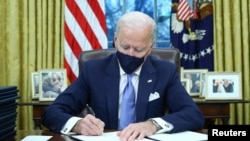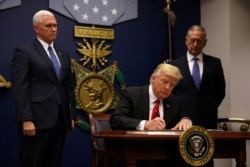U.S. President Joe Biden’s quick January repeal of his predecessor's travel ban on Iran has not yet revived Iranian arrivals to the United States, but it has reignited a debate about which Iranians the U.S. should allow to enter and whether existing methods for vetting them are effective.
Biden repealed former President Donald Trump’s travel ban on Iran and 12 other nations within hours of taking office on January 20. He said the visa restrictions on citizens of those nations, seven of them predominantly Muslim states in the Middle East and Africa, were inconsistent with a U.S. tradition of welcoming people of all faiths and undermined national security.
Trump had said the bans were justified by concerns about foreign terrorist entry to the United States and about the ability of U.S. authorities to screen visa applicants from nations afflicted by terrorism.
In the 40 days since Biden revoked the travel bans, there has been no influx of Iranians to the United States, according to the National Iranian American Council (NIAC) advocacy group that supports the president’s move. Iranians had made up the largest pool of visa applicants to the United States for decades, according to a January New York Times report citing Iranian-American advocacy groups and visa lawyers.
“Anecdotally and looking at the U.S. travel restrictions that still remain in place, I don't think there has been a significant change [in Iranians entering the U.S.] thus far. And I don't expect that to change immediately,” said NIAC policy director Ryan Costello in a VOA Persian interview.
The latest publicly available State Department data for international visa issuances show the United States granted 46 immigrant visas to Iranians in January, up slightly from 39 in December. The number of nonimmigrants visas issued to Iranians declined to 154 from 188 over the same period.
A variety of U.S. travel restrictions affecting Iranians remain in force. Biden decided to continue Trump’s pandemic-related ban on travelers who were physically present in Iran for 14 days preceding entry or attempted entry into the United States.
Biden also has made no changes to Trump’s 2019 entry ban for senior Iranian government officials and their immediate family members and 2019 designation of Iran’s Islamic Revolutionary Guard Corps as a foreign terrorist organization whose recruits are barred from the United States.
A 2012 ban on Iranians seeking to enter the United States for higher education courses that would prepare them for careers in Iran’s energy sector or nuclear program also remains in effect. It was signed into law by Trump’s predecessor, Barack Obama, for whom Biden served as vice president. Washington long has accused Tehran of seeking to weaponize its nuclear program, a charge Tehran denies.
Difficulties obtaining visas
Iranians not affected by those ongoing restrictions have faced other recent obstacles to obtaining U.S. visas. In a Monday press briefing, U.S. Acting Deputy Assistant Secretary for Visa Services Julie Stufft said the pandemic has “drastically decreased” the number of visa applicants whom the State Department can service at its overseas facilities and has reduced the number of visa processing personnel who can safely work at those facilities.
Costello said NIAC has been in touch with visa applicants in Iran who were not able to get consular appointments at various U.S. embassies in states neighboring the Islamic republic.
Stufft said some immigrant visa applicants from nations like Iran that previously were included in Trump’s travel ban had remained blocked from the U.S. by another Trump measure until just a week ago. That 2020 measure had barred immigrants seen as harming the U.S. labor market’s prospects for pandemic recovery, until Biden repealed it on February 24.
Another factor slowing the process of issuing U.S. visas to Iranians is Biden’s January 20 decision to give the State Department 45 days to create a plan for enabling immigrant visa applicants whose requests were denied under the travel ban to have their applications reconsidered. He also gave officials an even longer 120 days to submit recommendations on improving the screening and vetting of visa applicants by using foreign assistance funds to improve information-sharing with other countries “where appropriate.”
No such U.S. funds are likely to be given to Iran, with whom Washington has had no relations since 1979 and whose government remains under severe U.S. sanctions.
But Costello said the U.S. vetting system is strong enough to compensate for the absence of Iranian information-sharing about visa applicants, citing U.S. rejections of many such applicants for lack of verifiable background information before Trump’s travel ban took effect in 2017.
“Iranian visa applicants have to detail a ton of information about who they are, where they worked, whether they were ever drafted into the IRGC, and a bunch of other things. There are ways [for the U.S.] to get the information that it needs [to vet such applicants],” he said.
Not so, said U.S. attorney Stewart Baker, who served under former President George W. Bush as Homeland Security Assistant Secretary for Policy and recently wrote that revoking the travel ban seems to reopen U.S. borders to dangerous individuals. “We don't know Iranians’ motives for coming here, because it's very hard to figure that out with the information that we have,” he told VOA Persian in an interview.
Speaking to VOA Persian last month, U.S. House Foreign Affairs Committee Lead Republican Michael McCaul said Iran’s status as an enemy of Washington makes the vetting process for Iranian visa applicants “very difficult, if not impossible.”
Elliott Abrams, who served as U.S. Special Representative for Iran in the final year of Trump’s term, told VOA Persian he supports Biden’s decision to resume accepting visa applications from some U.S.-vetted Iranians and to maintain prior presidents’ policies of keeping other Iranians out.
“I think it is a good idea to enable Iranian students in general to study in the United States. Our fight is with the vicious regime that governs Iran, not with the people of Iran. We're on their side,” he said.
But Abrams also cautioned Biden against phasing out a visa applicant vetting technique used during the Trump administration, involving examination of an applicant’s social media accounts. Biden has called for a review of whether the use of social media identifiers has “meaningfully improved screening and vetting.”
“I don't understand the basis for the skepticism,” Abrams said. “Social media posts are a form of communication by an individual in public. If an Iranian visa applicant’s post applauds attacks on American bases in Iraq, wouldn't you want to know that?”
NIAC’s Costello said he expects some social media screening to remain after Biden’s review. “But how you ensure that screeners don’t target someone for a post that Americans normally would view as free speech is an important question that needs to be answered,” he said.
This article originated in VOA’s Persian Service. VOA State Department Correspondent Nike Ching and VOA Persian Congressional Correspondent Shahla Arasteh contributed.











